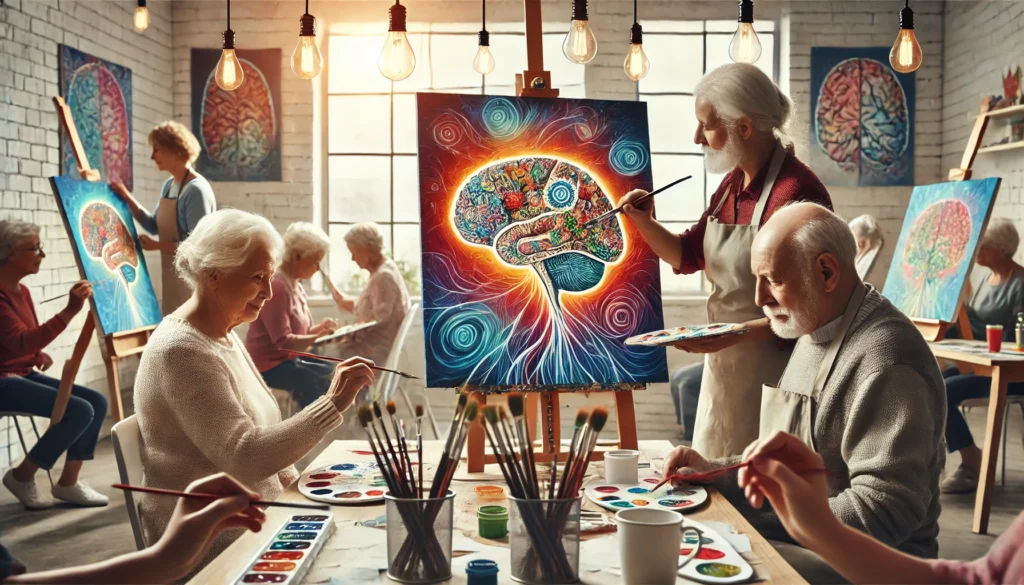In an ever-aging society, the quest to maintain cognitive health and reduce the risk of dementia has gained paramount importance. Dementia, a broad term encompassing various conditions characterized by cognitive decline, notably Alzheimer’s disease, poses significant challenges not only to individuals but also to caregivers and health systems worldwide. While the scientific community continues to explore pharmacological interventions, increasing evidence underscores the efficacy of engaging activities in mitigating dementia risk. Let’s delve into the array of activities that can potentially slow the progression of dementia, enhance brain health, and foster a fulfilling life.
You may also like: Top Herbs to Enhance Your Focus
Cognitive Stimulation: Brain Games and Beyond
Cognitive stimulation remains a cornerstone in the battle against dementia. Engaging the brain through various activities helps maintain cognitive functions and build a cognitive reserve that can delay the onset of symptoms.
The Power of Brain Games
Brain games have surged in popularity as a means to combat cognitive decline. These games, designed to challenge various facets of cognition, offer a compelling way to engage the brain actively. From crosswords and Sudoku to more sophisticated digital platforms, brain games stimulate neural pathways, potentially enhancing memory, attention, and problem-solving skills. Research suggests that such cognitive exercises for dementia can not only slow its progression but also improve the overall cognitive reserve. Regular engagement in brain games can lead to measurable improvements in cognitive performance, providing both immediate and long-term benefits.
Exploring Digital Platforms
Modern technology has expanded the realm of cognitive exercises beyond traditional pen-and-paper puzzles. Digital platforms offer interactive and engaging experiences, often tailored to individual cognitive levels. These platforms can track progress, adapt to the user’s performance, and provide a personalized cognitive workout. The convenience of accessing these games on various devices ensures that cognitive stimulation can be seamlessly integrated into daily life.
Beyond Puzzles: Diverse Cognitive Activities
While brain games are beneficial, a diverse array of cognitive activities can also contribute to dementia prevention. Engaging in activities such as learning a new language, playing a musical instrument, or even participating in intellectually stimulating discussions can provide comprehensive cognitive stimulation. These activities challenge the brain in novel ways, fostering neuroplasticity and encouraging the formation of new neural connections. Additionally, these activities often engage multiple senses and cognitive functions simultaneously, offering a holistic approach to brain health.
The Benefits of Lifelong Learning
The concept of lifelong learning emphasizes the importance of continually acquiring new skills and knowledge throughout life. This approach keeps the brain engaged, curious, and active. Whether through formal education, online courses, or self-directed learning, the pursuit of knowledge can significantly enhance cognitive resilience. Moreover, the satisfaction and sense of achievement associated with learning can boost self-esteem and mental well-being.
Creative Expression as Cognitive Stimulation
Creative activities such as painting, writing, and crafting offer unique cognitive challenges. These activities require problem-solving, planning, and fine motor skills, all of which engage different parts of the brain. Creative expression also serves as an emotional outlet, reducing stress and promoting mental clarity. By fostering creativity, individuals can develop new ways of thinking and enhance their cognitive flexibility.
Physical Activity: A Pillar of Brain Health
Physical activity is not only crucial for physical well-being but also plays a significant role in maintaining cognitive health. Regular movement promotes brain function, reduces stress, and enhances mood, all of which contribute to a lower risk of dementia.
Exercise and Cognitive Function
Physical exercise is a cornerstone of overall health, and its benefits extend to cognitive health as well. Regular physical activity increases blood flow to the brain, which can promote the growth of new brain cells and enhance memory function. Studies have shown that individuals who engage in regular physical exercise have a reduced risk of developing dementia. Activities such as walking, jogging, and swimming are excellent choices for promoting brain health and can be easily incorporated into daily routines.
The Neuroprotective Effects of Aerobic Exercise
Aerobic exercises like running, cycling, and swimming are particularly effective in promoting brain health. These activities increase heart rate and improve cardiovascular health, which in turn supports efficient blood flow to the brain. Aerobic exercise has been linked to the production of brain-derived neurotrophic factor (BDNF), a protein that supports the survival and growth of neurons, ultimately enhancing cognitive function.
Combining Physical and Cognitive Exercises
Combining physical and cognitive exercises, such as dance or tai chi, can provide dual benefits. These activities not only improve physical fitness but also require mental coordination, balance, and focus, offering a comprehensive approach to slowing down dementia naturally. Such activities are not only engaging but also enjoyable, promoting adherence and long-term commitment. They offer an opportunity to socialize, reducing feelings of isolation and enhancing overall well-being.

Strength Training for Cognitive Health
Strength training, often overlooked in the context of brain health, can also offer significant cognitive benefits. Resistance exercises improve muscle strength, coordination, and balance, which are crucial for maintaining independence and preventing falls in older adults. Additionally, strength training has been associated with improvements in executive function, memory, and attention, providing a multifaceted approach to cognitive preservation.
The Role of Outdoor Activities
Outdoor activities like hiking and gardening provide unique cognitive challenges. Navigating uneven terrain, planning a route, or tending to plants requires problem-solving and decision-making skills. The exposure to nature also reduces stress and enhances mood, creating a conducive environment for cognitive health. These activities encourage mindfulness and present opportunities for social engagement, further supporting cognitive resilience.
Social Engagement: Building a Cognitive Buffer
Social interactions are fundamental to human nature and play a vital role in maintaining cognitive health. Engaging with others provides mental stimulation, emotional support, and a sense of belonging, all of which contribute to a cognitive buffer against dementia.
The Role of Social Interactions
Social engagement is another vital component in reducing the risk of dementia. Interacting with others provides emotional support and mental stimulation, which can enhance mood and cognitive function. Social activities, whether joining clubs, volunteering, or simply maintaining regular contact with friends and family, contribute to building a cognitive buffer against dementia. These interactions challenge the brain, encouraging the use of language and memory, thus reinforcing neural pathways.
The Impact of Group Activities
Participating in group activities such as book clubs, sports teams, or hobby groups offers structured social interaction. These activities promote teamwork, communication, and shared experiences, all of which stimulate the brain. Group settings also provide opportunities to learn from others, exchange ideas, and build lasting friendships, enhancing both cognitive and emotional well-being.
Cultivating Meaningful Relationships
Cultivating meaningful relationships and participating in community activities can significantly impact mental health and cognitive resilience. These interactions encourage the use of language, memory, and problem-solving skills, thereby reinforcing neural pathways and contributing to brain health. Building strong social networks provides a support system during challenging times and can significantly reduce stress, anxiety, and the risk of depression.
Intergenerational Interactions
Engaging with people of different age groups offers unique cognitive and social benefits. Intergenerational interactions, such as mentoring or volunteering with youth, stimulate cognitive flexibility and creativity. These exchanges provide opportunities to learn new perspectives, foster empathy, and share knowledge, enriching the lives of both younger and older participants.
The Role of Digital Communication
In today’s digital age, maintaining social connections through technology is increasingly common. Video calls, social media, and online forums offer convenient ways to stay in touch with loved ones and participate in social activities. While digital communication cannot replace face-to-face interactions, it provides an accessible alternative for those with mobility challenges or living in remote areas, ensuring that social engagement remains a part of daily life.
Nutrition: Fueling the Brain
Nutrition plays a critical role in maintaining brain health and reducing the risk of cognitive decline. A diet rich in essential nutrients supports brain function, protects against oxidative stress, and promotes overall well-being.
Brain-Boosting Diets
A balanced diet rich in antioxidants, healthy fats, and essential nutrients is crucial for brain health. Diets such as the Mediterranean diet, characterized by high consumption of fruits, vegetables, nuts, and olive oil, have been associated with a reduced risk of dementia. These diets provide the brain with the necessary nutrients to function optimally and protect against oxidative stress and inflammation. Incorporating fish, whole grains, and legumes further enhances the brain-boosting properties of these dietary patterns.
The Role of Nootropics
Nootropics, often referred to as “smart drugs,” are substances that can enhance cognitive function. While some nootropics occur naturally in foods and supplements, others are synthetic. As a biohacker seeking to optimize brain health, exploring the latest breakthroughs in nootropics can offer additional avenues for enhancing cognitive performance and reducing dementia risk. Natural nootropics like caffeine, ginkgo biloba, and omega-3 fatty acids provide accessible options for those looking to support cognitive health through diet.
The Importance of Hydration
Adequate hydration is essential for maintaining cognitive function. Dehydration can lead to confusion, impaired concentration, and memory issues. Ensuring sufficient water intake throughout the day supports brain health and overall physical well-being. Including hydrating foods such as fruits and vegetables can contribute to maintaining optimal hydration levels.

The Benefits of Antioxidants
Antioxidants play a vital role in protecting the brain from oxidative damage. Foods rich in antioxidants, such as berries, dark chocolate, and green tea, help neutralize free radicals and reduce inflammation. Incorporating these foods into the diet can support brain health and reduce the risk of cognitive decline.
The Impact of Sugar and Processed Foods
Excessive consumption of sugar and processed foods can negatively impact brain health. These foods contribute to inflammation, insulin resistance, and oxidative stress, all of which are risk factors for cognitive decline. Reducing intake of sugary and processed foods and replacing them with nutrient-dense options can significantly benefit cognitive function and overall health.
Sleep: A Fundamental Pillar of Cognitive Health
Sleep is a critical component of cognitive health, influencing memory, mood, and overall well-being. Prioritizing quality sleep can significantly reduce the risk of dementia and enhance cognitive performance.
The Importance of Quality Sleep
Sleep plays a crucial role in cognitive health, influencing memory consolidation and brain detoxification processes. Poor sleep quality has been linked to an increased risk of dementia. Ensuring adequate, restful sleep is essential for maintaining cognitive function and overall well-being. Establishing a regular sleep routine and creating a conducive sleep environment are foundational steps in promoting healthy sleep patterns.
Strategies for Improving Sleep
Implementing sleep hygiene practices, such as maintaining a consistent sleep schedule, creating a comfortable sleep environment, and limiting exposure to screens before bedtime, can significantly improve sleep quality. Additionally, mindfulness practices and relaxation techniques can enhance sleep and overall mental health. Techniques such as deep breathing, progressive muscle relaxation, and guided meditation can help calm the mind and prepare the body for restful sleep.
The Role of Sleep Disorders
Sleep disorders like insomnia and sleep apnea can significantly impact cognitive health. Addressing these disorders through medical intervention, lifestyle changes, or therapy can improve sleep quality and reduce the risk of cognitive decline. Regular monitoring and treatment of sleep disorders are crucial for maintaining optimal brain health and overall well-being.
The Impact of Napping
Short naps can provide a cognitive boost, enhancing alertness, memory, and mood. Strategic napping, particularly in the early afternoon, can complement nightly sleep and support cognitive function. However, excessive napping or late naps may disrupt nighttime sleep, so it’s essential to balance napping with regular sleep patterns.
The Connection Between Sleep and Mental Health
Quality sleep is closely linked to mental health. Poor sleep can exacerbate symptoms of anxiety and depression, which in turn can impair cognitive function. Prioritizing sleep and addressing mental health issues through therapy, medication, or lifestyle changes can create a positive feedback loop, enhancing both mental and cognitive health.

Conclusion: A Holistic Approach to Dementia Prevention
In conclusion, reducing the risk of dementia requires a multifaceted approach that encompasses cognitive, physical, social, and nutritional strategies. By engaging in brain games, maintaining physical activity, fostering social connections, adopting a brain-boosting diet, and prioritizing sleep, individuals can actively work towards preserving cognitive health and enhancing quality of life. Embracing these strategies creates a robust foundation for cognitive resilience, allowing individuals to enjoy a vibrant and fulfilling life.
As a health and wellness coach, science journalist, or biohacker, incorporating these activities and strategies into your repertoire can empower you to provide clients or audiences with actionable insights and practical advice on how to prevent Alzheimer’s disease and dementia. Embracing a holistic approach to brain health not only aids in dementia prevention but also fosters a vibrant, fulfilling life at any age. By promoting these practices, you contribute to a broader societal effort to combat cognitive decline and enhance the well-being of aging populations worldwide.
Further Reading:
Mental activity may help prevent dementia
Do reading, puzzles, and similar activities really stave off dementia?
Important Note: The information contained in this article is for general informational purposes only, and should not be construed as health or medical advice, nor is it intended to diagnose, prevent, treat, or cure any disease or health condition. Before embarking on any diet, fitness regimen, or program of nutritional supplementation, it is advisable to consult your healthcare professional in order to determine its safety and probable efficacy in terms of your individual state of health.
Regarding Nutritional Supplements Or Other Non-Prescription Health Products: If any nutritional supplements or other non-prescription health products are mentioned in the foregoing article, any claims or statements made about them have not been evaluated by the U.S. Food and Drug Administration, and such nutritional supplements or other health products are not intended to diagnose, treat, cure, or prevent any disease.


